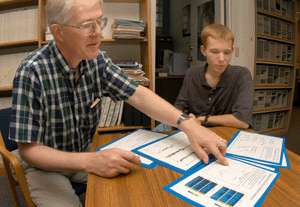News Archives - 2005
Augsburg’s space research has
a new connection to the ‘Old Country.’
A new National Science Foundation
grant for space research
 The
U. S. National Science Foundation (NSF) has announced funding for a new international
research effort, involving faculty and students from Augsburg College, the
University of New Hampshire, and the University of Oslo, Norway, to study
some of the fundamental physical processes involving the aurora borealis,
or northern lights. Augsburg will receive$ 301,000 over three years
for its efforts in this project.
The
U. S. National Science Foundation (NSF) has announced funding for a new international
research effort, involving faculty and students from Augsburg College, the
University of New Hampshire, and the University of Oslo, Norway, to study
some of the fundamental physical processes involving the aurora borealis,
or northern lights. Augsburg will receive$ 301,000 over three years
for its efforts in this project.
Norwegian scientists were some of the first to study the aurora, more than a century ago. (A picture of Kristian Birkeland, a physics professor at the University of Oslo, is on the Norwegian 200 Kroner bill.) Auroral studies are still a major area of research in Norway, now in cooperation with scientists from several other countries in Europe, the U.S., Russia, and Japan.
Based on a proposal submitted to NSF in January 2005, Augsburg Professor of Physics Mark Engebretson, University of New Hampshire Research Professor of Physics Marc Lessard, and University of Oslo Physics Professor and Department Chair Joran Moen will collaborate to build, install, and operate a set of search coil magnetometers at four sites on the Svalbard archipelago, a set of islands in the Arctic Ocean north of Norway. After these instruments are installed in late summer 2006, they will operate continuously throughout the following years to monitor magnetic variations associated with changes in Earth’s space environment, and in particular with the overhead aurora.
As with other research projects at Augsburg, undergraduate science students will be an integral part of the research team. Past and present Augsburg students have had opportunities to learn research skills and understand the cadence of scientific research, and dozens have been able to present their findings at scientific conferences or in scientific journals.